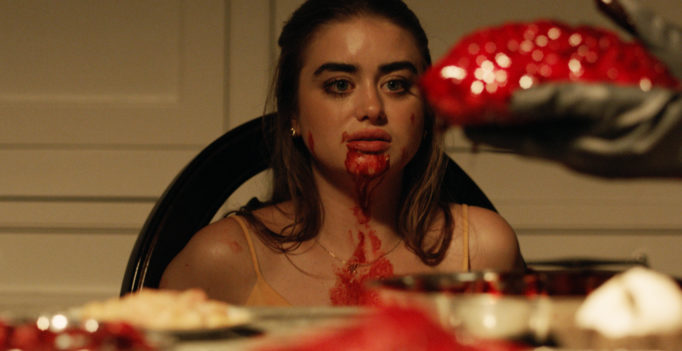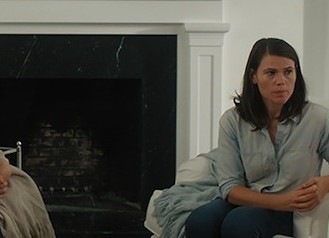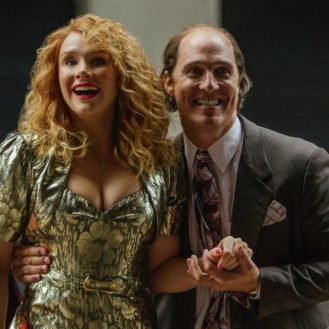By: Jolie Featherstone
If Alice in Wonderland was a tarot card, its inverse would be The Dinner Party.
Haley (Alli Hart) and Jeff (Mike Mayhall) are a young, married couple. Jeff is a playwright looking to move up the ladder toward success and prominence. They have been invited to a dinner party hosted by a mysterious couple named Carmine (Bill Sage) and Sebastian (Sawandi Wilson). Jeff is eager to impress them as he believes they will help boost his career, as they have done for others. From the moment they approach the front door, an air of foreboding permeates. As they enter the gorgeous, art-adorned house, they are introduced to an enigmatic group of serpentine figures. In addition to Carmine, a respected doctor with a slight Southern drawl, and the fashionable and gregarious Sebastian, they meet Vincent (director Miles Doleac), an intellectual with a sharp eye and an equally sharp tongue, Sadie (Lindsay Anne Williams), a preternaturally calm and intuitive artist, and Agatha, a seductive novelist whom Jeff admires. As they gather around the table for dinner, the guests partake in passionate discussions about art. When a tarot deck is brought forth, and Sadie reads each guest’s Major Arcana cards, the proverbial match is lit and the rest of the film burns forward into a psycho-spiritual-sexual carnival of the grotesque.
The Dinner Party situates its sleek, surreal, bourgeois-bohemian characters in a world of entrancement and dark intrigue. Though plenty of blood is spilled in The Dinner Party, the film is less for slasher flick fans and more for those who are interested in the Occult. Reminiscent of Joe Hill’s novel Horns (distinctly the book, not the film), it explores the notions of good vs. evil situated within a spiritual context. Horns challenges organized religions’ patriarchal fundamentalism and structural view of God as emblematic of pure goodness and Satan as emblematic of evil. Similarly, The Dinner Party touches upon the notions of patriarchy, gender-based violence, and provides an alternative, gender-conscious perspective to fundamental Christian views of right and wrong
The film is subterranean and populated with Dionysian characters, with the exception of Haley, who is the moral core of the film. The film is not for the faint of heart. There is cannibalism, necrophilia, physical violence, and mentions of childhood sexual abuse. However, Doleac is conscious of showing just enough to create uneasiness as opposed to blatant shock value. The mood of the film is always given priority.
Considering how fresh and delightfully surprising The Dinner Party’s final reveal is, the film would have benefited from using its time and pacing more efficiently to shed more light on how it came to be that this group dines together and why. I left the film wondering more about the character’s origins, motivations, and connection.
Alli Hart carries the film. Indeed, she is in almost every shot. We care for Haley and recognize her situation as someone unheard. Lindsay Anne Williams is spellbinding as the mystical Sadie. Sawandi Wilson also shines onscreen. His character, Sebastian, seems to be pulled straight out of Greek mythology.
Think Alice in Wonderland meets Dante’s Inferno, with the dark seductiveness of the first season of True Blood. The Dinner Party will satiate those interested in the Occult, witchcraft, and spirituality through a gender-conscious lens.
**********
Do You Tweet? Follow These Tweeple:
Jolie Featherstone: @TOFilmFiles





Be the first to comment